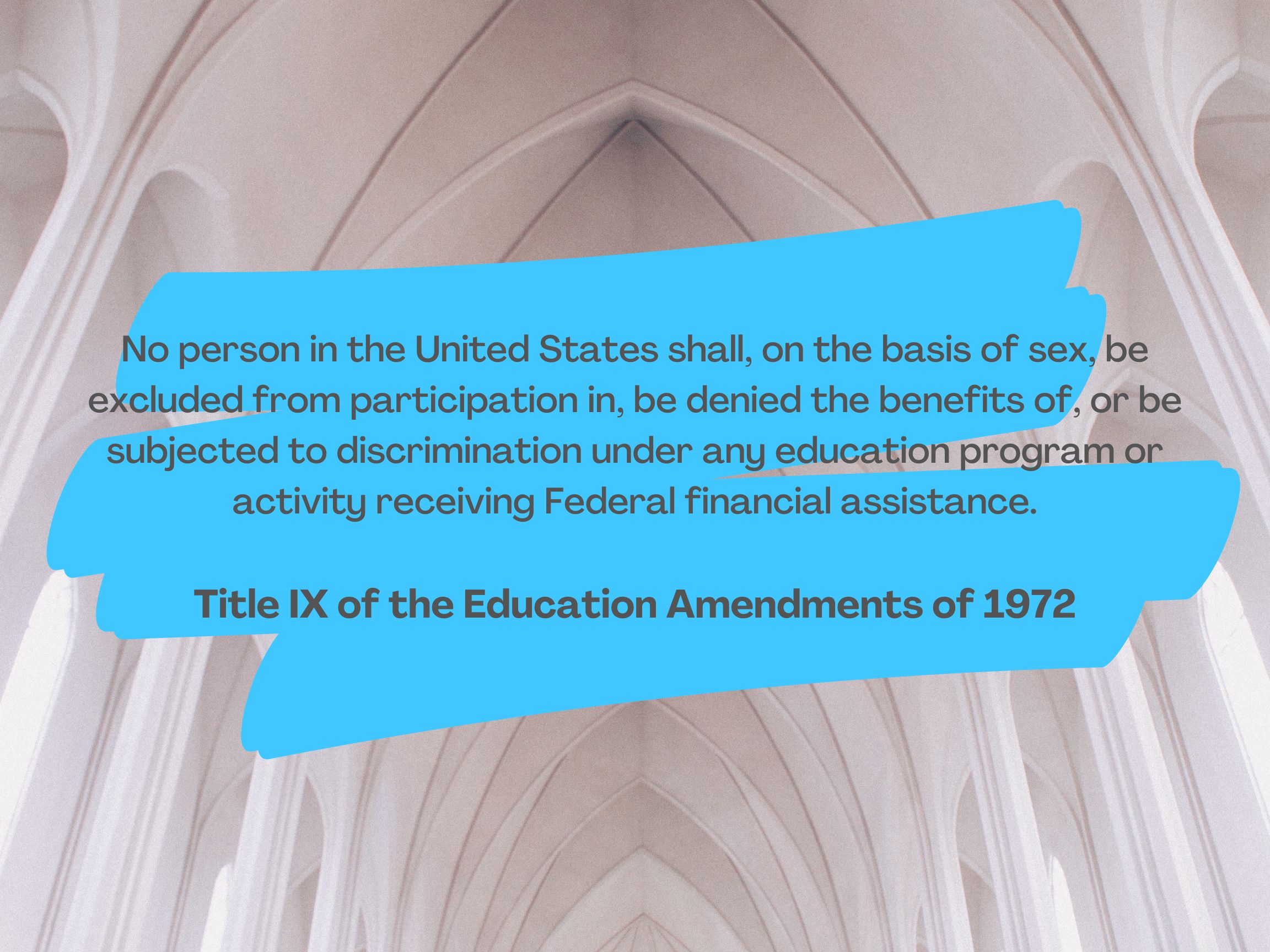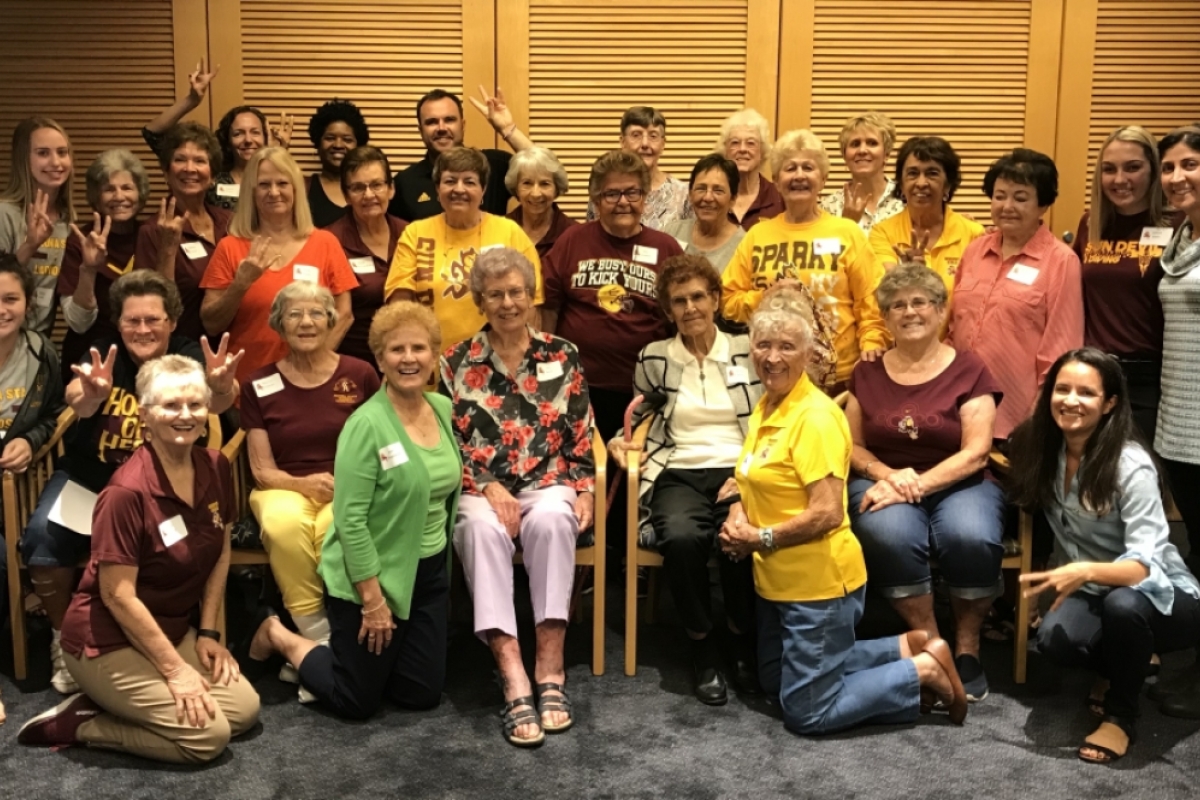Title IX at 50: Sun Devils level up for access, equity in academics, athletics

Fifty years ago on June 23, 1972, then-President Richard Nixon signed into law 37 words that would crystallize gender equity in education as a civil right.
Title IX of the Education Amendments of 1972 has removed many barriers that once prevented people, on the basis of sex, from participating in educational programs that rely on federal assistance. It impacts college admissions, financial aid, research and, perhaps most notably, women’s sports.
“Culturally, Title IX’s greatest influence on college campuses since 1972 has been its creation in women of an expectation of equality,” said Victoria Jackson, a sports historian and clinical assistant professor in Arizona State University's School of Historical, Philosophical and Religious Studies. “We see this best embodied by women athletes, who find their power through sport, and so often use that power and voice to create transformational societal change.”
Jackson, a former college athlete herself, is among a number of scholars, students and administrators who have been working tirelessly over the past several years to educate the ASU community about the importance and benefits of Title IX.
In 2017, Jackson and Deana Garner Smith, a senior associate athletic director for Sun Devil Athletics, collaborated with others to commemorate the 45th anniversary of Title IX with a yearlong project, and have kept the momentum going with programming, presentations and partnerships designed to elevate awareness about the rights to equity in academics and athletics.
“The impact of learning about Title IX for staff, coaches and student-athletes has been profound,” Garner Smith said. “In my short tenure, we have had several student-athletes use some aspect of Title IX as the foundation for their educational coursework — from Barrett Honors theses, to classroom assignments, to creating peer-peer educational training programs. All of these benefits of Title IX make it one of the most important laws for women and girls since women obtained the right to vote under the Nineteenth Amendment.”
In their advocacy of Title IX, Garner Smith and Jackson also carry forward the work of ASU women’s athletics pioneers who were doing the work of Title IX long before its passage. Garner Smith and Jackson recently took a time-out from their Title IX projects-in-progress to reflect on the work of their Sun Devil predecessors, Title IX wins, and the importance and impact of the landmark legislation.
Editor's note: Answers have been edited for length and clarity.
Question: Tell us about the research and projects you have been working on around Title IX here at ASU in recent years, and why these activities have been so important to you?
Victoria Jackson: Our efforts fall within a broader culture at ASU to build academic and athletic bridges, create community network, and grow relationships and partnerships with women’s sports organizations. From events honoring the Murphy’s Girls (the women who played elite, competitive sports under Nina Murphy’s leadership in the decades before the passage of Title IX) to educational and leadership programming for women athletes, a major motivation of our work is to create a culture in Sun Devil Athletics in which women athletes are provided with information to help them understand the generations of work behind building and sustaining women’s sporting opportunities.
A very fun example of the work we have done together was during a 2019 ASU women’s soccer team trip to Mexico, we helped organize, in collaboration with the Tec de Monterrey in Mexico, a public event on how sport helps girls and women find their power alongside a girls’ soccer clinic. But the project that has been most fulfilling has been our efforts with our respective teams in (the) history (department) and Sun Devil Athletics to capture and share the stories of ASU’s women’s sports history. It is a rich history!
With the help of Jordan Igo, an undergraduate research assistant who uncovered countless gems in the archives, we launched #TitleIXTuesday on social media for the 45th anniversary of Title IX in 2017. And now, this year for the 50th anniversary, students Camryn Williams in Sun Devil Athletics and Adam Gottner and Jacqueline Rowe in history have continued the work Jordan had started. You can follow along on all Sun Devil Athletics social media channels and look for the hashtag #TitleIX50.
Queens of the court #ForksUp | #TitleIX50 pic.twitter.com/QH1nQUBCTC
— Arizona State Sun Devils (@TheSunDevils) June 10, 2022
Deana Garner Smith: Each project we have collaborated on has enriched the lives of our Sun Devil Athletics staff, community and our student-athletes. The impact of the Murphy’s Girls and other living legends who have been ardent advocates for women’s participation in not only sports but obtaining an education has been very significant. Providing an annual platform for our coaches, staff and student-athletes to interface with these trailblazers continues to inspire them to strive for academic and athletic excellence.
Q: What have been the important eras or time periods in the history of Title IX, both at ASU and nationwide?
Jackson: ASU was a national leader in women’s team sports before the passage of Title IX. Women’s physical education instructors Nina Murphy, Anne Pittman, Mary Littlewood and Mona Plummer hustled to create competitive, elite sporting opportunities for college women who craved elite competition. This meant working 12- or 15-hour days for little additional pay; coaching or refereeing after a full day’s work of teaching and advising; holding bake sales; sewing uniforms; pooling resources to pay for one hotel room for the whole team; and piling everyone into a student’s station wagon to drive to California for a competition. Once the Association for Intercollegiate Athletics for Women commenced women’s championships — a decade before the NCAA did, by the way — ASU softball and volleyball teams, both led by Coach Mary Littlewood, won back-to-back national championships in 1972 and 1973, and 1973 and 1974, respectively. In addition to that period of ASU success in the 1970s, Sun Devil women have been enjoying much success in many sports from the 1990s onward.
When I arrived at ASU as a graduate student athlete in the mid-2000s, I had the good fortune to arrive in a moment when our women’s teams had started winning individual and team national titles left and right. Golf, softball, and track and field have enjoyed the most national championship success. Golf has won eight NCAA titles since 1990. Continuing the tradition of success started by the 1970s squads, softball made seven consecutive appearances in the Women’s College World Series from 2006 to 2013, winning twice in 2008 and 2011.
class="glide image-carousel aligned-carousel slider-start glide--ltr glide--slider glide--swipeable"
id="glide-483880" data-remove-side-background="false"
data-image-auto-size="true" data-has-shadow="true" data-current-index="0">
data-testid="arrows-container">
Track and field earned three NCAA team titles in 2007 and 2008 — two indoors and one outdoors — thanks in large part to the dominance and overall vibe of who I call ASU’s greatest athlete of all time, Jackie Johnson. I tease that Jackie was so excellent that even the men won a team national title (in 2007) thanks to her presence and influence, too. Deana and I have been on a mission to convey the message to our Sun Devil Community that Jackie is ASU’s GOATGreatest Of All Time. We think that all Sun Devil fans should know her name and sporting accolades.
Q: What has changed about the lives of college students since the passage of Title IX in 1972, and how would you say Title IX affected or impacted the lives of women on ASU’s campus?
Jackson: Title IX is not a sports law, though we certainly can see most dramatically the massive impact of Title IX in women’s college sports. But Title IX also revolutionized higher education for women. Title IX is the reason we see majority-women undergraduate student bodies. Title IX is the reason graduate schools, professional schools and STEM fields no longer can hold strict quotas severely restricting access for women. Title IX is why we see more women faculty. One document Jordan and I found in the archives that captures the transformation of higher education that Title IX stimulated was a spatial survey of the Tempe campus noting the location of all the women’s restrooms and identifying the many locations where more women’s restrooms would need to be constructed.
Garner Smith: Additionally, the other benefits Title IX affords beyond gender equality is it covers all aspects of the educational and or employment experience and requires that these opportunities occur and are free from sex discrimination. Title IX requires schools who receive federal funds to prevent and remedy sexual harassment and sexual assault. ASU’s own Sexual Violence Policy “is committed to providing an environment free of discrimination, harassment or retaliation for the entire university community, including all students, faculty members, staff employees and guests.”
Q: What are the hopeful outcomes of the work you have been doing around Title IX here at ASU?
Jackson: A major motivation of our work is to create a culture in Sun Devil Athletics in which women athletes are provided with information to help them understand the generations of work behind building and sustaining women’s sporting opportunities. We hope athletes come away with the understanding that this work is a project, an ongoing one requiring ever-present work, and one in which athletes can opt in to contribute to that work, to make sure future generations of girls and women get to continue to enjoy the right to play sports and to enjoy equitable sporting experiences. I am so proud to be at a university that operates with a culture and purpose that sees the civil rights functions of higher education and college sports in our mission and daily work.
Garner Smith: Since joining Sun Devil Athletics staff, I have been honored to work with my collaborators to coordinate annual sexual violence prevention educational trainings. My hope is to create a student-athlete, peer-led educational program so they can learn from each other about not only gender equity but sexual harassment and discrimination prevention. We have started this already and are hopeful that more like minded student-athletes will come forward to lead. This would be a pivotal moment that can hopefully shift the mindset around sexual harassment and discrimination in the collegiate sports arena.
More Arts, humanities and education

ASU professor, alum named Yamaha '40 Under 40' outstanding music educators
A music career conference that connects college students with such industry leaders as Timbaland. A K–12 program that incorporates technology into music so that students are using digital tools to…

ASU's Poitier Film School to host master classes, screening series with visionary filmmakers
Rodrigo Reyes, the acclaimed Mexican American filmmaker and Guggenheim Fellow whose 2022 documentary “Sansón and Me” won the Best Film Award at Sheffield DocFest, has built his career with films that…

Pen Project helps unlock writing talent for incarcerated writers
It’s a typical Monday afternoon and Lance Graham is on his way to the Arizona State Prison in Goodyear.It’s a familiar scene. Graham has been in prison before.“I feel comfortable in prison because of…





